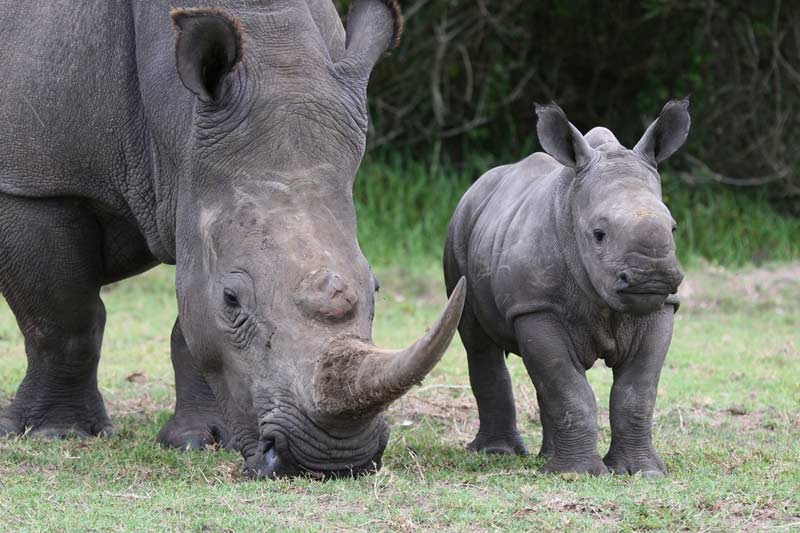Zoo Diet Linked to Dip in Baby Rhino Births

Zoos may be welcoming fewer baby rhinos into the world in the future: Their reproductive rates are dropping drastically because of medical problems. New research suggests their zoo diet could be playing a role in the drop in babies and increase in disease.
The zoo diet contains relatively high levels of estrogenlike compounds from plants (called phytoestrogens), which might be contributing to reproductive failure in the females, according to the new study published in the April issue of the journal Endocrinology.
"Understanding why the captive white rhinoceros population has been dwindling for decades is an important part of protecting the future of this species," study researcher Christopher Tubbs, a scientist with the San Diego Zoo Institute for Conservation Research, said in a statement. "Our work is the first step toward determining if phytoestrogens are involved in this phenomenon and whether we need to reevaluate captive white rhino diets."
Rhino reproduction
Other theories have been put forth to explain reproductive problems in females raised in captivity, including the female rhinos' constant close proximity to potential mates (rather than meet-ups for breeding) and suppression of their fertility from living alongside other females; however, these don't hold up, said Heather Patisaul, an assistant professor from North Carolina State University who wasn't involved in the research.
White rhinos are a "near-threatened" species, and wild populations face poaching and sport hunting. The southern white rhinoceros, Ceratotherium simum simum, one of two white rhinoceros subspecies, is the most abundant both in the wild and in zoos.
A survey by the International Union for Conservation of Nature found that in December 2007, an estimated 17,480 southern white rhinos were left in the wild, mostly in South Africa. Many white rhinos have been successful living in zoos, and wild-caught rhinos had been reproducing well, with 91 calves born in the San Diego Zoo Safari Park since 1972.
Sign up for the Live Science daily newsletter now
Get the world’s most fascinating discoveries delivered straight to your inbox.
Missing babies
Even so, a 2006 report found reduced reproduction rates in captive-born rhinos and increased rates of reproductive system diseases.
In the new study, the researchers compared healthy white-rhino populations with populations having problems with reproduction, citing diet as a key difference between the two. While the rhinos are naturally plant eaters, the alfalfa and soy the rhinos are fed in the zoos contain high levels of compounds called phytoestrogens, molecules that structurally resemble the hormone estrogen.
"Soy is a whole protein (meaning it contains all of the essential amino acids), making it a mainstay for most vegetarians. It is also lactose free, low in cholesterol, cheap, [and] easy to obtain," Patisaul writes in a News and Views piece in the same issue of Endocrinology. She notes that similar breeding problems plagued zoo populations of cheetah and other animals when fed a soy-based diet.
Edible estrogens
These estrogenlike molecules are known to be biologically active in the white rhinos. It's possible that side effects of phytoestrogens seen in humans and other mammals, which include lowered levels of fertility and disrupted menstrual cycle, could be what zookeepers are seeing in the rhinos.
In comparison, this phytoestrogen-filled plant diet doesn't seem to affect reproduction in the one-horned rhinoceros bred in captivity, which doesn't seem to be as sensitive to these plant compounds.
The white rhinos could be responding to the high levels of plant estrogens in their zoo diet because they are conditioned to, Patisaul said. Levels of phytoestrogens in plants increase when the plants are stressed, so it may serve as a sign to the rhinos not to invest in offspring at that time.
You can follow LiveScience staff writer Jennifer Welsh on Twitter @microbelover. Follow LiveScience for the latest in science news and discoveries on Twitter @livescience and on Facebook.
Jennifer Welsh is a Connecticut-based science writer and editor and a regular contributor to Live Science. She also has several years of bench work in cancer research and anti-viral drug discovery under her belt. She has previously written for Science News, VerywellHealth, The Scientist, Discover Magazine, WIRED Science, and Business Insider.











